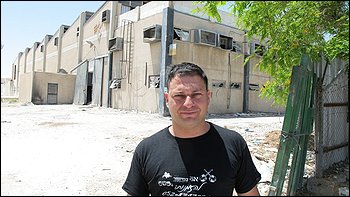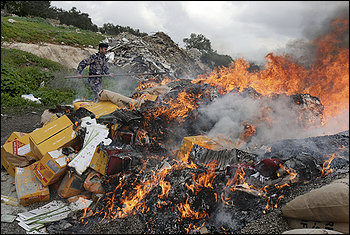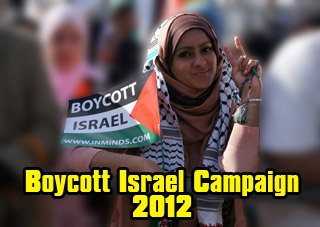
 Innovative Minds © 2014. All Rights Reserved. www.inminds.co.uk | ||||||||||||||
Palestinians turn to boycott in West BankJanine Zacharia Washington Post MAALEH ADUMIM, WEST BANK -- In Mishor Adumim, a bougainvillea-lined industrial zone inside this West Bank Jewish settlement, at least 17 businesses have closed since Palestinians began boycotting its products several months ago. For the Israelis, it's "an insufferable situation," according to Avi Elkayam, who represents the settlement's 300 factory owners. But for Palestinians, it might be the strategy they have been looking for.  Avi Elkayam represents 300 factory workers at the Mishor Adumim industrial park. (Janine Zacharia/the Washington Post) For more than 40 years, Palestinians have sought to end Israeli occupation and gain statehood. International terrorism, nearly two decades of negotiations and two major waves of mass revolt have all failed to bring measurable progress toward those goals. Now Palestinians are looking at the success of their boycott as evidence that a campaign focused on peaceful protest, rather than violent struggle, could finally yield results. The strategy originated at the grass-roots level but has increasingly been embraced by the Palestinian leadership. Top officials have shown up at anti-settlement demonstrations led by local activists trying to isolate Israel globally in a campaign roughly modeled on the South African anti-apartheid struggle. "We are definitely committed to a path of nonviolent resistance and defiance in the face of the settlement enterprise, and we are defiantly expressing our right to boycott those products and I believe it is working," Palestinian Prime Minister Salam Fayyad, who has attended bonfires of settlement products, said in an interview last week. "We will continue to do more." But Fayyad represents only a portion of the Palestinian political spectrum. Members of the Islamist Hamas movement, which seized control of the Gaza Strip in 2007, have continued to advocate violence even as they rhetorically embrace the idea of boycotts and other forms of peaceful protest. That has led some observers to wonder whether the experiment will eventually deteriorate into another armed uprising, especially if new U.S.-mediated peace talks lead nowhere. A Western diplomat who spoke on the condition of anonymity said the nonviolent-resistance campaign could backfire, hurting prospects for a breakthrough in negotiations. "All of these efforts are seen by the Israelis as an effort by the Palestinians to isolate Israel," the diplomat said. "One has to question whether this will be effective or whether it will push the Israeli government into a more reluctant mood." Motives in questionThe boycott, along with a forthcoming ban on Palestinian employment in the settlements, has already led Israeli officials to publicly question the motives of their Palestinian counterparts. "Are they for partnership or struggle?" Israeli Deputy Prime Minister Dan Meridor said at a news conference Monday. While Israel tries to ensure Palestinians have jobs, he added, Palestinian officials "try to raise unemployment by stopping them from working." Dealing in settlement goods has technically been illegal under Palestinian law since 2005, but Fayyad has pushed for enforcement only since the start of the year. The hope is that the boycott will encourage the international community to adopt a stronger stance against settlements while helping end the Palestinian economy's dependence on Israel. A dispute over settlement construction paralyzed peacemaking efforts for the first year of the Obama administration, which views such activity as illegitimate. Israel, under U.S. pressure, has agreed to a 10-month freeze on construction in the West Bank -- but not East Jerusalem -- that expires in September.  Palestinians burn products from Jewish settlements in the West Bank town of Salfit after starting a boycott several months ago. (Nasser Ishtayeh/associated Press) Palestinian Authority President Mahmoud Abbas signed a law last month making it a crime, punishable by up to two years in prison and a $14,000 fine, to sell settlement products. For Israel, the value of settlement products sold in Palestinian markets constitutes a small fraction of its $200 billion annual gross domestic product. Still, officials worry about the campaign morphing into a broader boycott of all Israeli goods. In addition to forcing factories in West Bank settlements to shut down or relocate inside Israel, the campaign is deterring other Israeli businesses from moving to the West Bank industrial zones, which were originally set up to be closer to Palestinian laborers, many of whom are denied permits to work in Israel proper. Ripple effectsThe Palestinian Authority has so far confiscated and destroyed $5 million worth of settlement products; by the end of the year, it will be illegal for Palestinians to work in the settlements. The Authority has established a national "empowerment" fund to help create other jobs for the roughly 25,000 Palestinians who now work in the settlements, but that remains a long-term proposition. For now, many Palestinian workers see no choice but to earn a living however they can. Abdel Aziz Abu Isnaineh, who distributes plumbing pipes and faucets manufactured in an industrial zone near the West Bank settlement of Ariel, was told he had until June 20 to sell his inventory of pipes. After that, whatever is left unsold will be confiscated and he will be fined. To Jihad Shaheen, a 42-year-old Palestinian grocer, the boycott seems pointless. One day in late April, a garbage truck drove up to his shop, and workers trashed 1,700 pounds of watermelons he had received from a settlement distributor. "If he had said all products from Israel were prohibited, I would understand," Shaheen said of the inspector who came with them, adding that a West Bank-only boycott "makes no sense." A stone-cutting factory here in the Maaleh Adumim settlement closed this month because Palestinian inspectors were routinely intercepting supply trucks, making business untenable, according to Elkayam, the factory owners' representative. The abandoned facility is now a concrete shell filled with bird droppings. A "for rent" sign is posted outside. Elkayam said that in addition to the boycott, factories have been hurt by an Israeli court order to pay Palestinians who work in the industrial zone the minimum wage. He now wants Israel to offer the owners tax breaks or some other kind of support. "If they don't, it will be too late," he said. "Everyone will close." Special correspondents Samuel Sockol and Sufian Taha contributed to this report. Source: http://www.washingtonpost.com/wp-dyn/content/article/2010/05/15/AR2010051501492.html Related ArticlesAlso Of InterestPage URL: http://inminds.com/article.php?id=10395
|
|
Support Us
If you agree with our work then please support us.Campaigns INMINDS Facebook Live Feed Latest Video's
INMINDS Twitter Feed Tweets by @InmindsComFeatured Video's
You need Flash player 8+ and JavaScript enabled to view this video.
[all videos (over 200)..] Featured MP3 Podcast  "The United States is 4.6% of the worlds people but still controls 50% of the worlds wealth and has a military that spends more than every other country in the world combined. I see this moment, as a moment that is very dangerous.. which is to say that the United States is a declining world economic power, similarly a declining political power, but what isn't declining is the military power. As you know from the 20th century that's a dangerous combination - a declining economic and political power but an overwhelmingly dominant military power. I think the national security state that we've seen organised since 9-11 in an unbelievably rapid way, which owes in no small part to Israel I must say, is a particular [example]." A founding member of the Weather Underground Meeting with members of 'Smash EDO' in Tel Aviv, April 2010 [88min / 40Mb] [all podcasts..] Newsletter Feedback |
 |
 |






















































